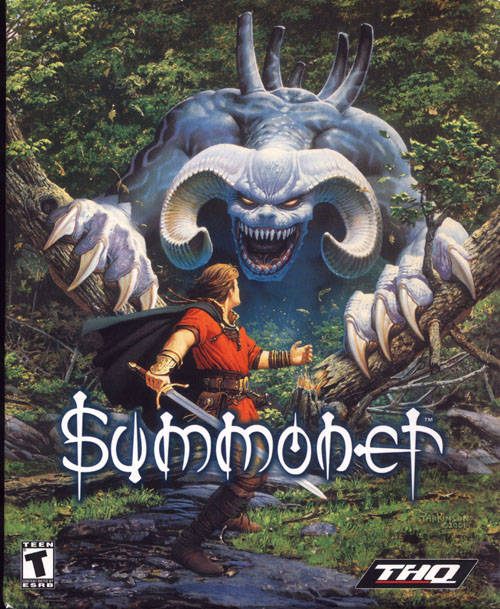When ever you're on a video game forum and feel the need to use the word "gamey" or "video gamey" to describe undeseriable game design trends, you should stop to think for a second and slap yourself.
Of course, you make a good point, but I'd say it's less of an undesirable trend than lack of a desirable one (that
Tehdagah , being an immense faggot, considers bad).
Having at least some game push the envelope towards less and less gamey stuff, striving to let us travel to worlds and experience (and influence) situations we could only imagine is what I really consider the main worth of vidyagames.
Origin's
"We build worlds." motto was there for a reason.
Yes simulationist elements can add meaningful depth to a game (CRPG inventory management, Thief/SS2/Resident Evil level design etc) but following that route can just as easily lead to a slippery slope of decline.
Sorry, but I just don't see it. You have absolutely no evidence of simulationism causing decline because it never has.
Claiming that playing as contemporary US mehreen and shooting contemporary AR at contemporary brown people with towels around their heads somehow makes a game simulationist even if it allows you to heal multiple bullet wounds by hiding behind an impenetrable box for a few seconds and almost nothing in it runs on actual mechanics as opposed to scripts is fallacious at best.
A game is simulationist if its mechanics focuses on determining what would happen in universe given particular circumstances and if the scripting doesn't throw a wrench in the works of this mechanics to the point of player being unable to count on stuff working like mechanics describes it.
The more you can describe non-predetermined stuff that happens in game in in-universe terms the more simulationist it is.
"Isometric RPGs in 2015 are unacceptable, they ruin my immersion!", cried the biofags. "Turn based combat breaks the metaphysics of the narrative!", cried the insane asylum escapee.

The thing is that kind of shit is just a bunch of strawmen.
You just needs to ask yourself what kind of game simulates stuff that happens during an armed conflict better - cowaduty or, say, Close Combat or JA?
Stuff like FPP and RT are the very lowliest forms of immersion.
Sure, as resident immersionfag I do appreciate them too, but they are overridden by pretty much everything else.
A FPS with rocket jumping, double jumping, wall running etc will have more depth and a higher skill cap than FPS with "realistic" or realistic movement speed and recoil. Same goes for 2D fighters vs MMA games. Dungeon crawler (as well as Doom's) level design is unrealistic and outdated because why would an evil dark lord design his own castle to be a maze full of teleporters. And so on.
What you're describing is dumbing down, not switching from simulationist to abstract game design. Casuals don't want to perform "tedious" tasks in RPGs any more than putting the effort to learning unrealistic moves with few frame time windows. You can still design intricate and deep CRPGs with abstract systems. Sometimes "simulationist" elements (like encumbrance in goldbox games, or having to find the correct key in Thief) are actually fun additions to gameplay. It all depends on the context and big picture whether a feature is beneficent to a gameplay system or not.
The thing is it's awfully hard to "smart up" an abstract system. Simulationism is a good thing because our reality is a complex, yet consistent system and we try to apply this, even if just subconsciously, to our fictional realities as well. Without having some idea regarding what should be the correct "shape" of the system you invent, the risk of ending up with a complete fucking mess increases exponentially with increasing complexity.
There is also the matter of intuitiveness - even a very complex game can be fairly easy to grok if it behaves in a way it "should".
Sure, a DM shooter will have a hard time being meaningfully simulationist (see my first point regarding undesirable trend vs lack of desirable one) and I definitely don't want to abolish games like UT, but even a gamey DM FPS clearly benefits from some simulationist elements. Take UT's headshots, elements of physics like projectiles being affected by gravity (grenades, flakcannon), etc.
A game doesn't need to be 100% sirius simulation to harness the benefits of simulationism, case in point:
Take into account that rocket jumping didn't originate as some completely abstract game-y mechanics someone put into games to make them more interesting. It arose from simulationist rule of "explosions blow stuff away", even if it was put in a game-y context.
When you design purely abstract games, it wouldn't even occur to casuals that "hey, you could use this thing as a pretty neat storytelling medium". Once you start briding the gap with titles like Half Life, you start attracting Hamburger Helpers who consider gameplay secondary. Soon after developers will start removing puzzles from adventure games (so they wouldn't stop you from enjoying the story) and dumbing down FPS games and making RPGs from first person perspective (to increase immersion).
Most of the time it's the other way around - wannabe movie directors wanting a storytelling medium and tacking on some half-assed abstract mechanics to make it a vidyagame.
If you want less Herplers, try to attract as many simulationists as you can because there are few things they hate more than rigid scripting especially if it violates the established rules of the gameworld.
We are fucking sperging and are dead serious about it.
Simulationism != narrativism.
Well I agree with you in that it is an FPS classic. But it had some things in it in which to me felt....very cinematic. I mean comparing that to say...Doom, Ris eof the Triad, or Heretic back in the day.
Well, it had a lot of one-off scripting (arguably cinematic), but mostly going on in the background (making it much less cinematic).
It also was more involved in telling a story than those semi-abstract action romps were (yes, the story was pretty cliche, but the game spared no effort putting you in Black Mesa). That makes it necessarily less similar to most old FPSes which were fairly abstract and where location and story were often pretextual and the whole point was getting to shoot whatever the devs thought cool at the moment with whatever the devs thought cool at the moment and more similar to movies which are non-abstract in a way.
I'm not a fan of scripted content because of its inflexibility (and I definitely can see how HL could have been less linear, then again it was comparable to other FPS games), but HL used it as really effective window dressing and in the end it provided rich and fun FPS mechanics to drive its gameplay.
But you made a good case in describing why HL is not necessarily.."movie-like" in the sense of some of the other popamole stuff out there. For example, FFX is just a cutscene game with tons of filler combat. You're just playing long enough to see the next cutscene while you grind away. That was my experience anyway.








![Glory to Codexia! [2012] Codex 2012](/forums/smiles/campaign_tags/campaign_slushfund2012.png)
![Have Many Potato [2013] Codex 2013](/forums/smiles/campaign_tags/campaign_potato2013.png)























